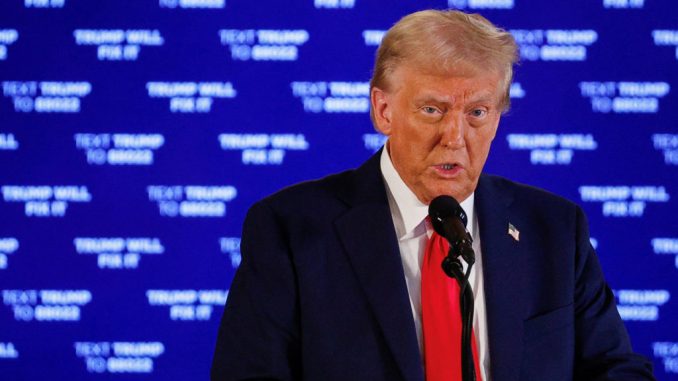
In a statement that has sent shockwaves through financial markets and political circles, former President Donald Trump hinted at a potential plan to make cryptocurrency the dominant form of currency in the United States. Speaking at a rally in Florida on Monday, Trump teased a bold vision that could upend the traditional monetary system, leaving analysts and supporters buzzing with speculation.
The Trump Cryptocurrency Vision
While Trump did not lay out specific policies, his remarks suggested a fundamental shift in his economic approach. “We’ve seen the potential of blockchain, of Bitcoin, and all these new technologies,” Trump told a cheering crowd. “America has always been a leader in innovation, and maybe it’s time we lead the world into a new financial era.”
This is a marked departure from Trump’s previous stance on cryptocurrency. During his presidency, he was notably critical of Bitcoin, referring to it as a “scam” and a tool for illegal activities. His administration, however, did not take significant steps to regulate or promote digital currencies.
Experts believe Trump’s change of tone is a reflection of the growing acceptance of cryptocurrencies in mainstream financial markets. Since leaving office, cryptocurrencies have surged in popularity, with governments, banks, and corporations exploring their potential.
Mixed Reactions from the Financial World
Trump’s remarks have elicited mixed reactions from financial experts and policymakers. Supporters argue that adopting cryptocurrency as the primary currency could position the United States as a global leader in fintech. “This is a game-changer,” said crypto investor and entrepreneur Tyler Winklevoss. “The United States has the opportunity to take control of the financial future, and this kind of leadership is exactly what we need.”
On the other hand, critics are wary of the implications of such a radical shift. Economist Paul Krugman expressed concerns about the volatility of cryptocurrencies and their lack of regulation. “Cryptocurrency is not a stable store of value,” Krugman said in an op-ed. “To make it the primary currency is to gamble with the nation’s economy.”
The banking sector is similarly divided. Some see an opportunity to innovate, while others fear disruption. JPMorgan Chase CEO Jamie Dimon, a longtime crypto skeptic, cautioned against rushing into adoption. “It’s one thing to integrate blockchain technology into banking; it’s another to abandon the dollar,” Dimon said in a CNBC interview.
Political Implications
Trump’s statements also carry significant political weight as he gears up for another possible presidential campaign in 2024. The prospect of a cryptocurrency-driven economy could energize younger voters and tech-savvy entrepreneurs, demographics traditionally outside Trump’s core support base.
“This could be a strategic move to broaden his appeal,” said political analyst Sarah Kendricks. “Cryptocurrency is particularly popular among millennials and Gen Z, groups that have been critical of Trump in the past.”
However, Trump’s proposal could alienate traditional conservatives and older voters who remain skeptical of digital currencies. The Republican Party itself appears divided on the issue, with some lawmakers advocating for innovation and others warning of the risks.
Senator Ted Cruz (R-TX), a vocal supporter of Bitcoin, applauded Trump’s openness to cryptocurrency. “This is the kind of forward-thinking leadership America needs,” Cruz tweeted. Conversely, Senator Elizabeth Warren (D-MA), a Democrat, was quick to criticize the idea. “Cryptocurrencies are a threat to financial stability and a boon for bad actors,” she wrote.
Implications for the Dollar
Making cryptocurrency the primary currency in the United States would have far-reaching consequences for the dollar, which has long been the world’s reserve currency. Some experts warn that such a move could undermine confidence in the dollar and erode its global dominance.
“It would be an unprecedented shift,” said financial historian Niall Ferguson. “The dollar is deeply embedded in global trade and finance. Replacing it with cryptocurrency would disrupt the global economy.”
Others, however, see potential benefits. Advocates argue that cryptocurrencies could enhance financial inclusion, reduce transaction costs, and provide a hedge against inflation.
“If managed properly, this could be a revolutionary step,” said blockchain researcher Caitlin Long. “Cryptocurrencies offer transparency, efficiency, and the ability to bypass corrupt financial systems. The United States could set a global standard.”
Challenges Ahead
Despite the excitement, significant challenges remain. Cryptocurrencies are notoriously volatile, with values that can swing dramatically in a matter of hours. Security is another concern, as digital wallets and exchanges have been frequent targets of cyberattacks.
There is also the issue of regulation. While some countries, like El Salvador, have embraced Bitcoin as legal tender, others, including China, have cracked down on its use. The United States has yet to establish a comprehensive regulatory framework for cryptocurrencies, and Trump’s proposal would likely face intense scrutiny from Congress, the Federal Reserve, and international organizations.
What’s Next?
As Trump continues to tease his vision, the financial world will be watching closely for concrete details. Will he advocate for Bitcoin, Ethereum, or a government-backed digital dollar? Will he propose sweeping deregulation or new oversight measures?
For now, Trump’s hints have sparked a debate that could shape the future of the American economy. Whether his plan is visionary or reckless remains to be seen, but one thing is clear: the era of cryptocurrency is here, and it’s forcing America to rethink its financial priorities.
The Bottom Line
Donald Trump’s suggestion to make cryptocurrency the primary US currency is a bold and controversial idea that could redefine the nation’s economic landscape. While the proposal has generated excitement among crypto enthusiasts and innovation advocates, it has also raised significant concerns about stability, regulation, and the future of the dollar.
As the conversation unfolds, Trump’s remarks have ensured that cryptocurrency will remain a hot topic in both financial and political arenas, highlighting the complex intersection of technology, policy, and leadership
Leave a Reply